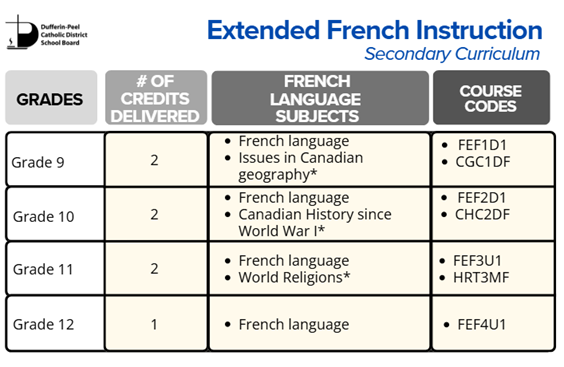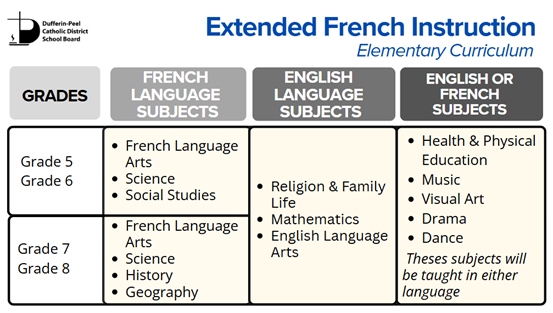About DPCDSB Extended French Programs
The Extended French Program begins in Grade 5 and continues through Grade 12. The program provides students with the means to develop more advanced French skills, enabling them to communicate effectively in listening and speaking, as well as reading and in writing. Students will receive a minimum of 1,900 hours of instruction by the end of Grade 8.
Grade 5 Extended French Application Process
Parent/guardian virtual information sessions for the 2026-2027 Extended French program will be held on the following dates. We ask that parents/guardians attend one of the following online sessions:
|
Extended French School Region |
Session Date & Time |
Meeting Information |
|
MISSISSAUGA |
Tuesday, November 4, 2025 @ 7:00 p.m.
|
Click here to join the |
|
BRAMPTON, CALEDON & DUFFERIN |
Thursday, November 6, 2025 @ 7:00 p.m.
|
Click here to join the |
Note about Microsoft Teams: For optimal access, use a computer device (desktop, laptop or Chromebook) or use the Microsoft Teams App.
Parents/guardians are encouraged to download the Reflection Tool below to discuss and reflect on the Extended French program with their child:
Random Selection Process
Extended French is a regional program of choice with limited enrollment, and admission is by application. Where the number of applications exceeds available space at a school, a school-based computer-generated random selection process will be held following the application deadline.
Eligibility
Entry into the DPCDSB Extended French program begins in Grade 5. Students who wish to enter the Grade 5 Extended French program must be eligible to attend a DPCDSB school. Currently, the Extended French program is only offered for in-person learning at designated Extended French locations.
Parents/Guardians who wish to enroll their child in an Extended French program after the Grade 5 entry point, can do so only if the following conditions are met:
- Space at the Extended French School is available (in-person learning only), and;
- The student was previously enrolled or currently enrolled in an Extended French Program, and/or;
- The student can demonstrate appropriate French language proficiency (an assessment may be required).
Elementary and Extended French School Locations
The DPCDSB Extended French is a regional program, and each individual Extended French site is open to students within their boundaries. Elementary students should attend the Extended French School in their designated area. Secondary Extended French locations receive students from elementary Extended French schools that feed into their boundaries. DPCDSB offers the Extended French Program at eleven elementary school sites and six secondary schools.
Please click on the links below to view the school maps and a list of Extended French locations with their feeder schools.
Extended French Curriculum
Instruction in elementary Extended French is provided 50% of the time in each official language. Seven credits will be taught in the French language in the secondary grades.
Secondary Extended French Program

Extended French in secondary schools requires students to complete a specific number of credits each year. Students accumulate 7 credits in French, 4 in FSL language courses and 3 in other subjects in which French is the language of instruction.
Students in the Extended French program have the opportunity to challenge the Diplôme d'Études en Langue Française (DELF) in their grade 12 year. The DELF is a globally recognized certificate of French proficiency in more than 165 countries. More information: DELF Examinations in DPCDSB
* For these courses, students will follow the same curriculum as their peers in English-language.
Contact
For more information about applying and registering to the Extended French Program, call 905-890-0708 ext. 24588 or 24374.
